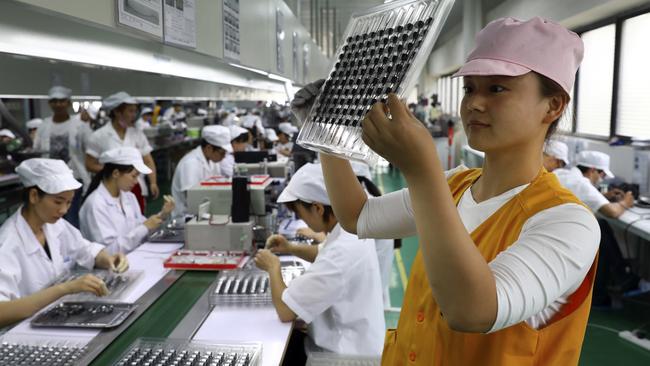Donald Trump signals retreat on China technology restrictions
US President Donald Trump has suggested he will scrap plans for new restrictions on Chinese investment in US technology.

President Donald Trump has suggested he will scrap plans for new restrictions on Chinese investment in US technology and rely mainly on existing tools that some of his advisers have labelled inadequate to guard against the purchase — and theft — of innovations vital to the US economy.
“We have the greatest technology in the world. People come and steal it,” he said in response to questions from reporters at the White House. “We have to protect that and that can be done through CFIUS,” referring to an inter-agency group, the Committee on Foreign Investment in the US, which screens foreign investments to see whether they endanger national security.
He said a recent article in The Wall Street Journal that reported the administration was planning two further initiatives, in addition to CFIUS, to prevent Beijing from obtaining advanced US technology was “a bad leak … probably just made up”.
As recently as Sunday, administration officials and others who work closely with the administration had said the plans for the restrictions were on track, though Mr Trump had not approved them.
If Mr Trump’s decision holds, it would represent a significant easing of threats the President has made against China and a possible olive branch to Beijing before the July 6 imposition of the first tariffs on Chinese goods under the Trump administration’s trade offensive. “This suggests that some rationality might be returning to the approaches on trade and investment restrictions,” said Cornell University economist Eswar Prasad, who speaks often with Chinese officials.
“But it doesn’t necessarily signal a pullback from (a) hardline stance on China.”
Investment restrictions in addition to CFIUS have long been part of the administration’s planned efforts to keep China from moving ahead with plans outlined in its “Made in China 2025” report to become a global leader in 10 broad areas of technology, including information technology, aerospace, electric vehicles and biotechnology. A May 29 White House statement said the policies would be aimed at “Chinese persons and entities” that seek to acquire “industrially significant technology”.
Politicians who have worked on a bill to overhaul CFIUS have also been arguing in administration meetings that additional investment restrictions are not necessary. “The legislative change is designed to deal with a narrow but important aspect of dual-use technology that’s being compromised by strategic investments by countries like China,” said Senate majority whip John Cornyn, a Texas Republican.
A bill to strengthen CFIUS passed the house yesterday by a 400-2 margin. A similar measure has already passed the Senate and the two versions now need to be reconciled. It would assure CFIUS reviews of more transactions, particularly those involving state-owned firms.
It would also create a new export control system to review whether overseas joint ventures are improperly transferring critical technologies to foreign companies.
Industry lobbyists and China experts attribute Mr Trump’s shift to recent declines in the stockmarket and to US companies getting battered by tariffs in US trade battles with the EU, Canada, Mexico and China.
Mr Trump this week warned Harley-Davidson that moving production overseas would mark “the beginning of the end” of the iconic brand, a day after the manufacturer said it planned to make more motorcycles abroad to avoid EU tariffs.
People familiar with the Trump White House deliberations said the President wasn’t reacting to the markets. Rather, the plans for restrictions had run up against legal obstacles, among other problems.
Relying mainly on CFIUS — if that is the final decision — would be a victory for Treasury Secretary Steven Mnuchin, National Economic Council director Larry Kudlow and others who have tried to tamp down the burgeoning trade battle with China.
Mr Mnuchin has been concerned that the investment restrictions could be interpreted abroad as a first step to shutting down the US market.



To join the conversation, please log in. Don't have an account? Register
Join the conversation, you are commenting as Logout